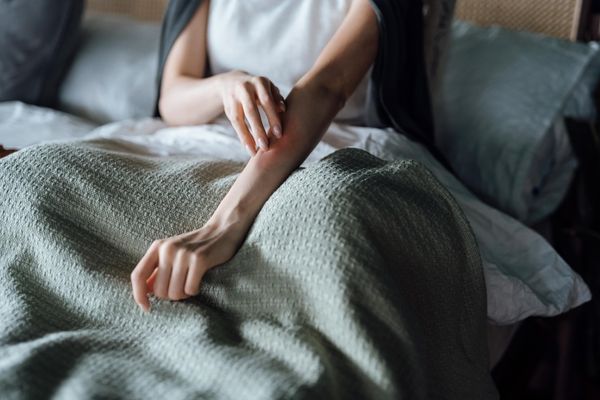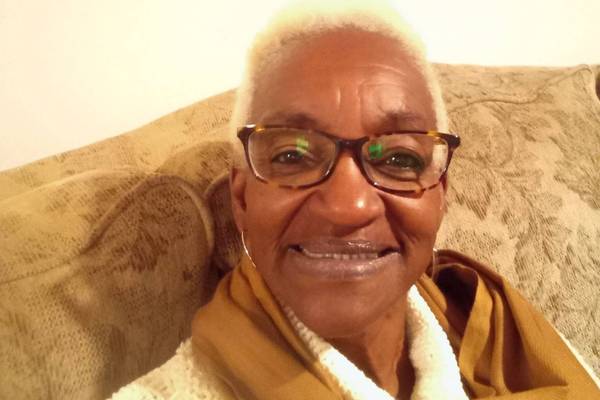As told to Nicole Audrey Spector
I was the woman who everybody asked, “What’s your skincare routine? You always look amazing!”
I hesitate to use the word “perfect,” as it’s so loaded, but that’s the word that comes to mind when I think of how my skin looked in my 20s and early 30s.
I live in Southern California, where the weather is typically sunny and warm. I practically lived in crop tops and shorts. I never thought twice about what I wore as long as I was comfortable.
Then, at 34, I got pregnant and everything changed.
When I was about six months along, I noticed a small red dot on my belly. It itched, vaguely. “Weird,” I thought. “But probably nothing.” I put some cocoa butter on it and bookmarked it in my mind as something to keep an eye on.
But I didn’t have to keep an eye on it because, by the next day, the little dot had grown into a big, inflamed circle, demanding my attention with an intense itch. I applied more cocoa butter, along with coconut oil, which soothed the itch for a short while.
Soon after, angry red patches began appearing all over: on my arms, legs, scalp and face. My whole body became itchy and dry. I covered myself in lotions and oils, and my skin absorbed them instantly. I felt like a giant, insatiable sponge.
As the outbreaks intensified, my self-esteem took a beating. Gone was the upbeat and confident woman who bared all in a bikini without hesitation. In her place was a person who needed to hide herself behind layers of clothing, even in the blazing heat.

I started staying home more and more. I blamed my new tendency to self-isolate on the challenges of being pregnant — which was a lie. In truth, I was terrified of someone seeing what had happened to my once-spotless skin.
It wasn’t so much that I felt ugly because of the rashes — though that was certainly a factor. It was that I worried people would deem me contagious or unclean. It had happened before.
Once, a friend noticed a flaky red patch on my arm and laughingly cried, “Do you have scabies?” It was a joke, I knew. But jokes have a way of getting toxically stuck in your head when you’re already feeling insecure.
My instinct was to just keep hiding. I didn’t even let my husband see me bare-skinned and kept my affliction hidden from him, worried he would be disgusted by me.
I’d been waiting out the days until my routine checkup with my OB-GYN, trusting that he could help. When the appointment finally happened, my doctor looked at the rashes and declared that it was eczema, also known as atopic dermatitis.
Eczema can pop up anywhere on your skin, making it red and itchy. It can be triggered by so many things — asthma, allergies, stress, anxiety and even hormone changes, to name but a few possible causes. Between 15% to 20% of people experience eczema or another type of dermatitis. It is not contagious, and while there is no known cure, there are various treatments available to manage it.
My doctor was certain that pregnancy hormones were to blame for the onset.
“It’ll clear up once you have the baby,” he said.
The doctor recommended I apply hydrocortisone to the affected areas to calm the itching and sent me on my way.
The thought that hydrocortisone would help gave me such hope. But I was quickly disappointed when I found it did basically nothing. The itching raged on and new red bumps developed. Nights were the worst. I was already struggling with pregnancy insomnia and difficulty finding a comfortable sleeping position. Now I couldn’t stop itching. Some nights I couldn’t resist; I scratched until I bled.
I became more and more isolated. I’d never felt so sad and defeated before. After days spent mostly huddled in bed, fighting the urge to claw myself open, I thought, “Oh, my god, is this depression?”
My husband came with me to my next routine checkup with my OB-GYN (I was now around eight months into my pregnancy). Finally the truth was revealed to him. He felt bad that I had been suffering so long in silence.
I held onto my doctor’s confident prediction that the eczema would resolve after I gave birth, but alas, he was wrong about that, too. If anything, the eczema worsened after my son was born.
It’s been a decade since then and over that time, it’s been a rollercoaster. My symptoms have gone up and down. Sometimes I have almost nothing to complain about; other times, especially when I am menstruating, I am an itchy mess. Stress also seems to make the eczema worse, and managing it all during the chaos of Covid has been a challenge. I’m juggling so many things, and in-person doctor appointments aren’t as simple to get as they used to be.
I’d like to be able to say that I’m no longer self-conscious about my eczema flare-ups. But I still favor long sleeves and long pants. I still get nervous about being exposed and welcomed the arrival of Zoom because it means people don’t see my whole body when we interact.

No, I haven’t regained my confidence completely, but I’ve become much more at ease with talking about it with others, including my sons. I may not yet be able to show my skin off when it’s hurting, but I want my sons to know that they shouldn’t be ashamed if they ever get eczema. It’s a common condition, and it doesn’t make you an ugly or unclean person. Beauty and goodness aren’t about the radiance of your complexion. It’s about who you are as a human.
The more I demonstrate strength, courage and openness to my sons, the more I begin to actually feel that I am strong, courageous and free. I’m not there yet, but I believe that one day, I will be able to show my skin off again — “perfect” or not.
This resource has been created with support from Pfizer, Regeneron and Sanofi.
- Atopic Dermatitis Shows Up on Your Skin, but Its Effects Go Much Deeper ›
- How Psoriasis Affects Your Overall Well-Being ›
- How Eczema Affects Sexual Health ›
- Clinically Speaking: Questions to Ask Your Healthcare Provider ... ›
- Options for Treating Atopic Dermatitis - HealthyWomen ›
- WomenTalk: Flare and Care for Eczema - HealthyWomen ›







